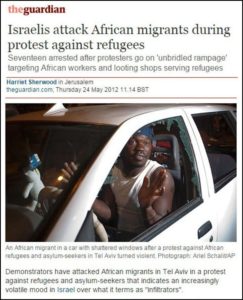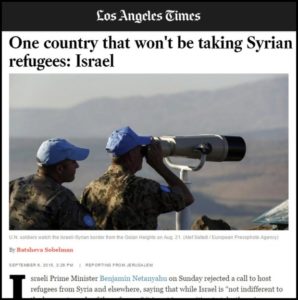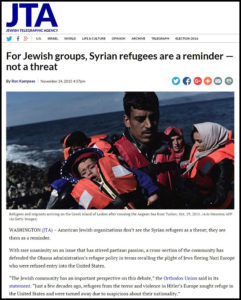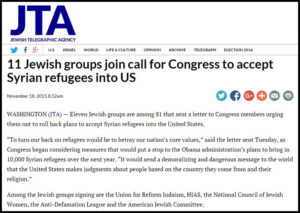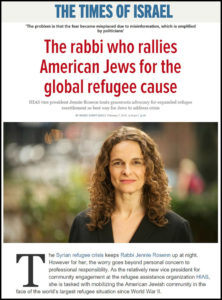“Talking to many supporters in recent days, there is a great resonance around our own history. My own grandparents were refugees in Britain, and I think my story is similar to many in my generation and my parents’ generation,” Paul Anticoni, executive director of World Jewish Relief, told the Post. “We have an empathy of looking after the stranger, and I think there is a desire to assist, irrespective of the nationality of the individual.”
The agency recently launched an emergency appeal for refugees. However, Anticoni notes that this is sadly not a new issue, and his organization has been supporting refugees in and around Syria since 2013.
Supporting the appeal, Britain’s Chief Rabbi Ephraim Mirvis said: “As Jews, many of us have family members who were refugees and our heritage must inform the way that we respond to the migrant crisis.
This is a deep and tragic humanitarian emergency,” urging the Jewish community to provide a compassionate response.
British Prime Minister David Cameron’s pledge this week to take in 20,000 refugees from Syria by 2020 has been slammed by critics as inadequate.
Anticoni says he is on the one hand proud that the British government has led in its humanitarian support to the refugee crisis in the region, but would like Britain to be a welcoming and open environment to those requiring sanctuary.
“I’d like to see our doors more open,” he says, opining that if handled appropriately, receiving refugees into Britain can be a success story. “We’ve seen from our own history the enormous contribution that Jewish refugees made to Britain over the past 70-80 years,” he says by way of illustration. “Similarly, communities from our Ugandan, Asian influx even from the European influx has strengthened parts of our economy.”
He highlights the importance of “helping people understand the vulnerabilities that these refugees face and the opportunities the bring – it’s a bit about understanding the complexity of the situation, bringing a personal dimension to it, because you can always convince people to change their minds.”
United States
HIAS is another organization drawing upon its history of helping Jewish refugees fleeing pogroms to lead the way today in helping settle Syrian refugees in the US. HIAS was founded for the former purpose in 1881 on the Upper East Side of New York City, but now helps refugees worldwide.
“Over the last 15 years, as Jewish settlement needs have receded, we’ve focused on broader refugee protection and consider ourselves to be a humanitarian agency,” HIAS president Mark Hetfield told the Post. “We are an agency motivated by Jewish values in order to protect refugees. Meaning, we protect them because we are Jewish, not because they are Jewish.
“Through our network of Jewish service agencies, we help resettle refugees by putting them in homes, in houses, getting them enrolled in English classes, getting their kids enrolled in school and trying to get them jobs.
“In terms of Syrians, the problem is that very few Syrians have been resettled in spite of the tremendous need. But HIAS has been resettling a proportional amount,” he says. This year HIAS has resettled 56 Syrian refugees, but hopes to resettle another 37 by the end of the month. “But since we resettle 3,500 refugees every year, we should be resettling more than that.”

